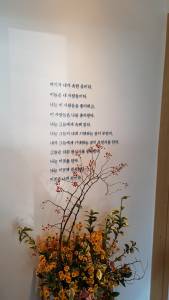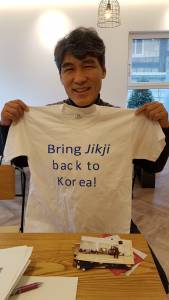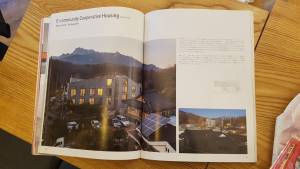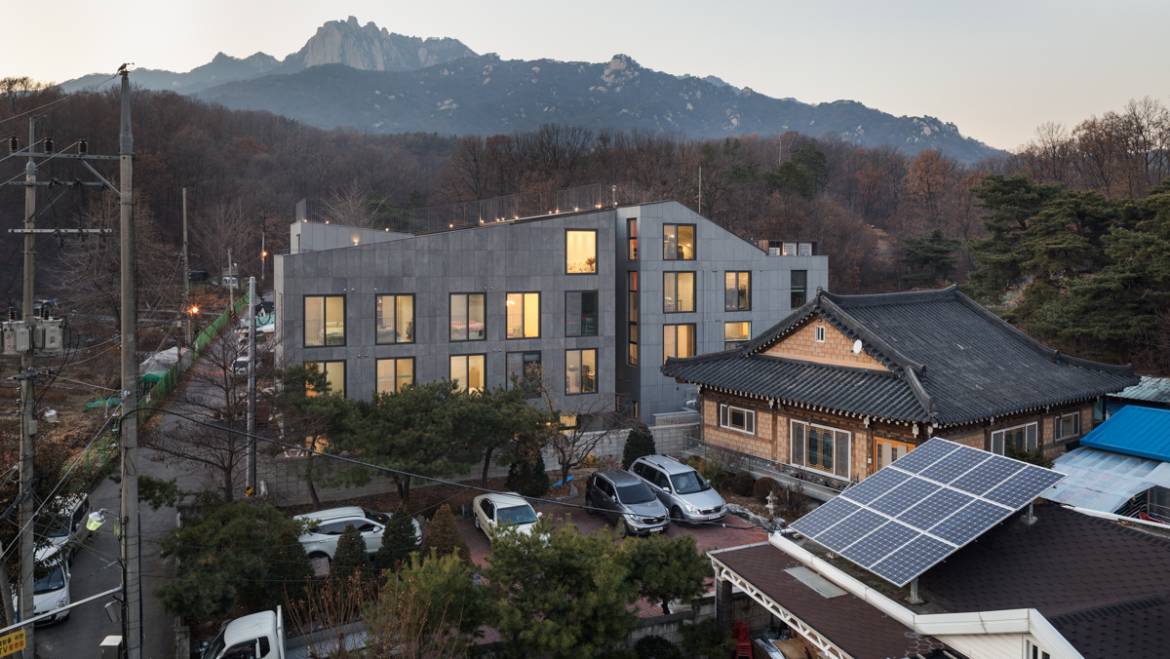So much of what we hear these days is doom and gloom―political battles, a slumping economy, corruption, K-pop stars committing suicide, social problems and thunderous threats from North Korea.
It’s enough to make a person pull up the covers and stay in bed. But there are, in fact, reasons for optimism and things to warm the heart.
My friend Audrey Lim enabled me to experience one of them recently. A person at the Eunhye Community extended an invitation to her, and she tagged me along. We drove her car north to Uijeongbu, stopping outside an angular building with a spectacular view of Mount Dobong.
We walked in, removed our shoes in the foyer and before stepping inside, took note of a poem on the wall. Audrey translated it thus: “Here is where I belong / These are my people / I like these people / and they like me / I belong to them / I know what they expect from me / and what I expect from them / They like my interests / I like this place / I am familiar with this place / This is my home.”
The poem could express the feelings of young children or highly accomplished adults, and some of both groups live at the Eunhye Community.
Before our meeting with Park Min-su, the man most responsible for its foundation and sustenance, we were able to read an article about it in an architecture and lifestyle magazine, and look around.
 The three-story, 992-square-meter facility cost 5 billion won and was completed in 2017. Its architects are Kim Tae-young and Kim Hyun-jin (both graduates of Seoul National University) from a firm called Urban Topology.
The three-story, 992-square-meter facility cost 5 billion won and was completed in 2017. Its architects are Kim Tae-young and Kim Hyun-jin (both graduates of Seoul National University) from a firm called Urban Topology.
The exterior is granite with a slanted, zinc-coated steel roof, and the interior features birch plywood on the ceilings and walls with bangkili wood flooring―all very tastefully designed and immaculately clean.
The motif, I would say, is minimalism. There are private bedrooms, although some of the kids have bunk beds, girls here and boys there. Every floor has a main library, a children’s library, a cafe and a communal room for concerts, group discussions and weekly activities. This big and yet cozy home is all about residents’communion, with nature and with each other.
Park arrived, and a barista served us coffee. Born and raised on a Sinan County island, he was originally a pastor at a church near Kyung Hee University in Seoul. It evolved to more than just a place to preach the gospel.
The church was a community center, tending to the needs of locals as well as parishioners. I can see how Park, who speaks calmly and mellifluously, might have such an effect on people; he exudes kindness and friendliness, as willing to listen as to speak.
For more than a decade, Park was the daepyo (leader or director) of a group of individuals and families who consciously practiced communal living. During that time, he made plans for Eunhye Community which, if not utterly unique, is quite special.
Fifty people live there, ranging in age from 10 months to 47 years. Some of the children attend local schools, and others are educated on site by certified teachers. Among the adults can also be found lawyers, designers, chefs, government officers, nurses and one woman who writes scripts for Korean TV dramas. Another 40 members reside in the neighborhood.
“We don’t have a board of directors,” Park said. “Instead, we hold group meetings once a month and discuss things. We talk until we reach a consensus. Originally, we were structured in such a way that I had too much power, so I changed it so we could have a more democratic system. There is a waiting list of people who want to join, but we are very careful in choosing. We don’t want any psychopaths. There is one standard for everybody, rich or poor. We strive for harmony.”
Is this really Shangri-La just a few kilometers north of Seoul? Park concedes that there have been some bumps in the road, and one or two contentious people have been asked to leave. But such things are rare.
Eunhye Community seems to have been conceived and implemented so well, on such wise principles, that its residents live with each other in a copacetic manner.
People fortunate enough to be chosen as members must undergo 10 months of training in communal living and agree to donate 25 percent of their income. That seems quite reasonable to me.
“We like to think of ourselves as one nation, a small, happy government,” Park added. “We are situated in a natural, peaceful location. The kids can run and play safely. We eat together, have cultural programs four times a year and are able to go up on the roof to view Mount Dobong whenever we want.”


2 Comments
Richard, this reminds me of a group of people from Europe who came to the southern banks of the Trinity River in Dallas County, Texas, USA, in 1855 called La Reunion, which was a socialist experiment based on the writings of the Frenchman Charles Fourier. It was led by Prosper Considerant. I find that name to be an oxymoron. The peoples consisted of French, Swiss and Belgian citizens who traveled across the Atlantic who had bought into the whole idea of sharing equally. Sure, they were getting away from despots like Napoleon. La Reunion unfortunately failed after 18 months due to financial insolvency. These were people were of status and not agrarians in their home countries and so none knew about farming and ranching, nor were they strong enough to “get their hands dirty” and do the physical labor. So they didn’t have anything to sell or trade with the people outside their communal group. After it dissolved, in time, the Swiss crossed the Trinity and ultimately settled in a community called East Dallas and named their street Swiss Ave. Hopefully these folks in Korea stay the course. But, at best, It is an experiment and when their main dude passes on, will the rules be kept and will the 9 months of interviewing persist? I am an individual and don’t want to share stuff that I have worked hard for with those who are able but won’t work hard for stuff. I could never live in a commune. To me, the lazy unproductive sorts are who this idyllic society attracts.
Hmmm…. I see only the slightest connection between La Reunion and Eunhye Community. The former, as you say, were idealists and dreamers–not to mention strangers in a strange land. The latter consists of Koreans in Korea, all sharing Korean culture. Perhaps you judge too quickly and too harshly. I have no idea how long it will last, but I think they are doing something worthy and remarkable. They have my sincere respect. I do not see them as lazy in any way. Each adult donates 25% of his or her income, not everything he or she owns. I might have mentioned that Mr. Park is not the only person deeply involved in making Eunhye Community a success, however that term may be defined. If he were to die, I assume others would carry on. I agree with you on one key point, and I said it to Audrey: I could not live there because of the relative lack of privacy.
Add Comment